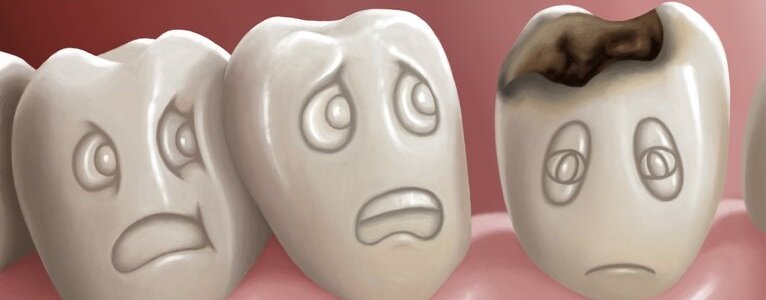Teeth cavities are something that often leads to dental pain and unsightly tooth decay if it is left untreated. If tooth decay has occurred, you may work hard to avoid smiling, which is also something you should not have to worry about. A dental exam and proper brushing routines are just a couple things you can do to maintain good oral health. Here are the top three ways to prevent cavities from developing.
Don’t Ignore Your Toothbrush!
You may have heard a million times to brush your teeth regularly, but that is because it is a truly important way to prevent cavities, tooth decay, dental pain, and other oral health problems. Since most people don’t usually experience any warning signals from their teeth like they would if they strained a muscle, they tend to feel that it is alright to push brushing aside.
Tooth decay and other oral problems are slow processes so any potential damage can happen at an elongated pace and go unnoticed. Be sure to brush your teeth in slow, short strokes and do it thoroughly around all areas. It is also best to brush in a circular pattern when possible. The slower method allows the bristles to remove bacteria and food in deeper areas and better protect against cavities.
In summary, there are many things you can do to prevent cavities, but the three recommendations above are at the top of the list. A dental exam is very important to oral health. For those that discover that they have a cavity, your dentist will use dental fillings to protect the area from further damage. Proper brushing of your teeth may help with preventing cavities, but it is never enough. That is another good reason to get a dental exam every six months.
A Routine Dental Exam, Prevent Potential Cavities
By getting a dental exam every six months, you not only maintain good oral health, but also discover issues or situations that can lead to dental pain and cavities, such as acid erosion from plaque and carbohydrates from certain foods. A dental exam will eliminate those developing issues that can easily get missed from regular oral care and that will help keep cavities at bay. If cavities are found, dental fillings may be used to halt their production.
Worst Foods for your Teeth
Foods with a high level of sugar and/or starch can enhance the development of plaque, which naturally develops good and bad bacteria on the teeth. The bad bacteria can cause cavities, dental pain, and other problems. Brushing the teeth removes the old plaque to help prevent bad bacterial growth. However, you may not be able to brush after every meal and may get hungry periodically and want a snack. Watching what you eat and when plays a big role in preventing cavities and other dental problems because the longer food particles and plaque sit, the more bacteria your teeth will have. Obviously, you need to consume some tooth-destroying foods and drinks to stay healthy, but try to do it when you can brush to reduce cavity risks.
Some of the foods and drinks bad for teeth that can cause cavities include:
- Sticky foods like dried/dehydrated fruits that get stuck in teeth
- Sugary soda drinks and fruit juices that cause plaque, which turns to bacteria that eats away the protective enamel
- Potato chips, which have starch that leads to plaque build-Up
- Alcoholic drinks, which dry out the mouth and prevent good bacteria through reduced saliva production
- Sugary sports drinks, which cling to the tooth’s enamel and erode the surface to allow cavities to develop
- Ice when chewed because it damages the enamel surface that prevents cavities
- Acidic fruits like oranges, lemons, and grapefruits that eat away at the enamel surface
Questions? Give us a call: 04 226 9474









